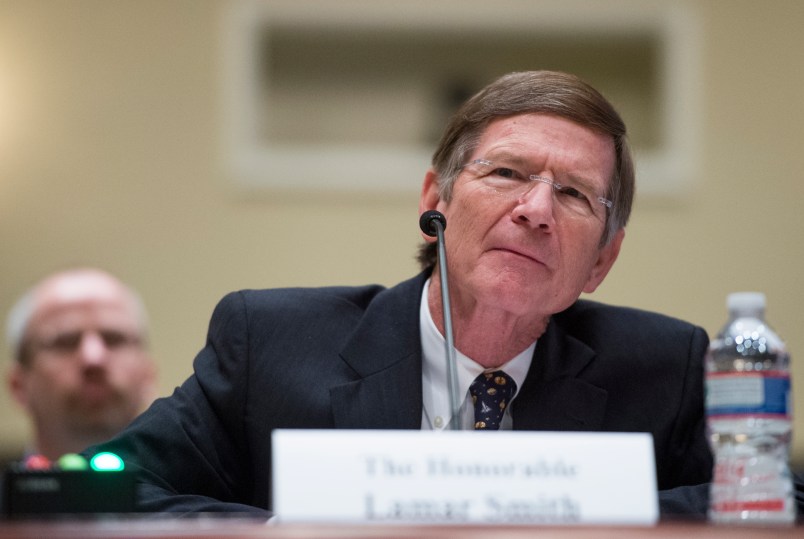After Rep. Lamar Smith (R-TX) last week said that the National Oceanic and Atmospheric Administration (NOAA) rushed the publication of its June climate study, Science, the research journal that published the research, rebutted the congressman’s claims this week.
“This paper went through as rigorous a review as it could have received,” Ginger Pinholster, the chief communications officer at the American Association for the Advancement of Science, the group that publishes Science, told the Washington Post in an interview published on Monday. “Any suggestion that the review was ‘rushed’ is baseless and without merit.”
Pinholster told the Post that the NOAA paper went through two rounds of peer review, and that the process was lengthier than it is for the average study published in the journal.
Smith, climate skeptic and chairman of the House Science Committee, has been on a months-long mission to prove that the NOAA ‘s June climate study was politically motivated. The study released by the NOAA contradicted earlier studies that had shown that global warming had slowed.
The chairman has subpoenaed the internal communications of NOAA scientists about the study, but the agency has refused to turn over the documents, citing the importance of keeping scientists’ discussion of their work confidential. Smith has also sent two letters to Commerce Secretary Penny Pritzker calling on her to force the NOAA to turn over the documents.
In his latest letter, Smith accused the NOAA of rushing the study to publication, adding that “the timing of its release raises concerns that it was expedited to fit the administration’s aggressive climate agenda.”
“Information provided to the Committee by whistleblowers appears to show that the Karl study was rushed to publication despite the concerns and objections of a number of NOAA scientists, ignoring established and standard NOAA scientific processes and potentially violating NOAA’s scientific integrity policies,” he wrote. “NOAA employees raised concerns about the timing and integrity of the process but were ignored.”
One of the authors of the study, Thomas Peterson, told the Post that the scientists working on the study had a disagreement with NOAA computer engineers who were working on software code for the data. Scientists were comfortable using data that had already been made public, and the NOAA moved ahead with the study. Peterson emphasized to the Post that the analysis of the data was not rushed.
The NOAA also issued a response to Smith’s latest letters on Friday, noting that the agency has asked the Science Committee to clarify the subpoena, which NOAA Administrator Kathryn Sullivan described as “extremely broad.” She said that Smith’s office refused to narrow the scope of the subpoena and declined when the NOAA attempted to set up transcribed interviews with NOAA employees.
As the NOAA continues to push back against Smith’s accusations and demands, the scientific community is worried about a chilling effect that his efforts could have on future research. Groups like the American Meteorological Society and the Union of Concerned scientists have defended NOAA’s refusal to turn over internal communications.
Andrew Rosenberg, the director of the Union of Concerned Scientists’s Center for Science and Democracy, told TPM that a congressional subpoena of this sort is “pretty unusual.”
“I think it’s unconscionable to use this kind of aggressive action for a single study and to go after the scientists and all their communications as a political tactic,” he said. “This has a chilling effect on science.”
Rosenberg said that Smith’s attempts to prove that the NOAA was politically motivated could discourage young scientists from working for the government or tackling controversial areas.
“Do you want people to shape their research around how it’s going to be perceived in a political setting, what the legal proceedings are going to be? I don’t think so,” Rosenberg told TPM. “You want the research to be the most creative, innovative, contribute the most to knowledge, not confirmed to a particular legal strategy or political agenda.”






